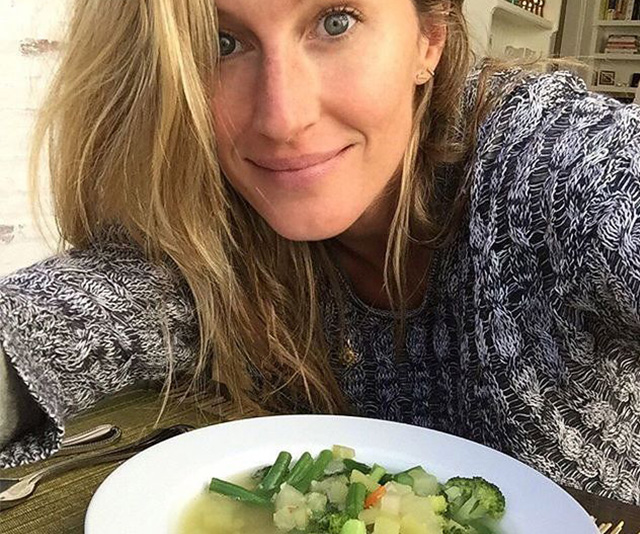Spaghetti bolognaise or zucchini lasagne instead? If you’re cooking for a crowd, chances are the decision is made for you when you realise there will be at least one vegetarian at your table.
No longer a fringe movement, vegetarianism is attracting more Australians than ever before. There are now more than two million vegetarians in Australia, with at least eight per cent of the population in each state saying they eat “all, or almost all, vegetarian” food, according to 2016 research.
Accredited practising dietitian Melanie McGrice says most make the change to express their support for a range of environmental and animal-friendly principals, but end up loving the health benefits, too.
“As a clinical dietitian working in private practice, the majority of women I see who follow a vegetarian diet do so for ethical reasons – they care about sustainability, and want to ensure there are enough resources for future generations,” she says. “They also care about animal cruelty, and want to minimise harm.”
And if you’re curious about the health and slimming benefits, there does appears to be a pay-off – 15 per cent fewer vegetarians are overweight or obese, compared to the general carnivorous population.
We quizzed Melanie for the facts on going vegetarian, and what to eat, in a nutshell.
What do I need to know before going vegetarian?
Before giving up meat you need to consider where you’ll get your protein, iron, zinc and omega-3. You’ll also need to decide what you class as “meat”. For example, are you simply cutting out red meat, or are you cutting out all poultry, seafood and fish also?
Can women over 50 be healthy and nourished on a vegetarian diet?
Definitely! A vegetarian diet can be a healthy diet for women 50-plus, but it’s vital to ensure you’re meeting your requirements for protein, iron, zinc and omega-3 from alternative sources.
How can I replace the protein I’d previously had from meat in a vegetarian diet?
To meet your protein requirements, consume plenty of eggs, legumes, tofu, nuts, seeds and dairy products.
Can I be vegetarian and still eat eggs?
Yes, you can, as ovo-vegetarians eat eggs but not dairy.
What supplements should I take when going vegetarian?
It depends which meats you decide to cut out and what you’re replacing them with; for example, if you cut out red meat, but still eat fish, you can easily get enough omega-3 that way.
But if you decide to cut out both red meat and fish, you may require an omega-3 supplement. If you’re unsure, speak to an accredited practising dietitian for personalised advice.
Will I lose weight being vegetarian?
It depends on what you replace meat with, and what was causing your weight gain in the first place. If you were overweight from consuming too much cheese and wine, going vegetarian probably won’t make any difference, but if you were overweight because you were eating excessive amounts of meat, then it may help!
What is the difference between vegetarian and vegan?
There’s actually quite a few different terms for vegetarians. Pescetarians don’t eat meat, but do eat fish, dairy and eggs; lacto-ovo-vegetarians don’t eat meat, but eat dairy and eggs; and vegans avoid all animal products, including meat, poultry, fish, seafood, dairy and eggs.
Why do some vegetarians eat fish and seafood?
Including fish and other seafood provides a lot of additional nutrition to a vegetarian diet, and is generally seen as more environmentally sustainable than eating red meat, if that’s your motivation to change your diet.
Any advice for eating out as a vegetarian?
It depends on how strict you want your vegetarian diet to be. If you choose a pescetarian or lacto-ovo-vegetarian approach, it’s usually pretty easy to find a meat-free meal on most menus. But if you follow a strict vegan way of eating, you may need to ask the waitstaff about whether there are any animal products in sauces, gravies and even certain fats and oils.
What are some good vegetarian recipes to cook at home?
Preparing vegetarian meals is no more difficult than cooking meat and three veg. If you’re looking for easy inspiration, start with traditional Australian meals, such as frittata and salad or minestrone soup.
Simple pescetarian dishes include tuna patties with salad or fish and steamed vegetables.
How do I transition to a vegetarian diet? What is Meat free Monday?
You can try the vegetarian lifestyle by joining the global movement called Meat Free Mondays (MFM). All you do is stop eating meat for one day each week. “Eating less meat can help minimise the ecological footprint of your food because stock breeding has a detrimental impact on the environment,” MFM organisers say. Find out more at Meat Free Monday.



.jpg)